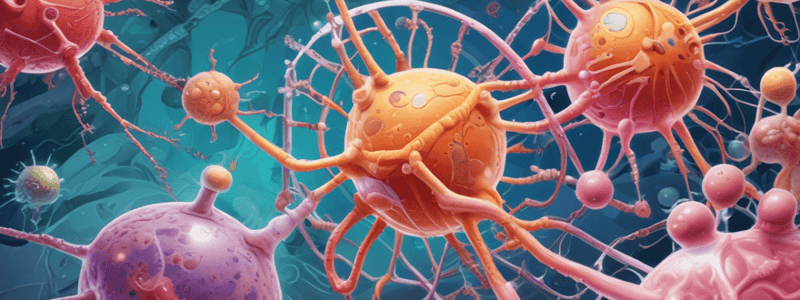Podcast
Questions and Answers
What is a major advantage of monoclonal antibodies in terms of their source?
What is a major advantage of monoclonal antibodies in terms of their source?
- They provide a lifelong and constant source (correct)
- They can be obtained from multiple animals
- They require minimal purification
- They are only suitable for small antigens
Which type of antibody is best suited for large antigens with changing epitopes?
Which type of antibody is best suited for large antigens with changing epitopes?
- Monoclonal antibodies
- Recombinant antibodies
- Synthetic antibodies
- Polyclonal antibodies (correct)
What is a limitation of polyclonal antibodies?
What is a limitation of polyclonal antibodies?
- They are not suitable for immunoassays
- They are only obtained from mice
- They require minimal purification
- They have a finite source due to animal mortality (correct)
What is a major difference between monoclonal and polyclonal antibodies in terms of their production?
What is a major difference between monoclonal and polyclonal antibodies in terms of their production?
What is a common application of monoclonal antibodies?
What is a common application of monoclonal antibodies?
What is a characteristic of monoclonal antibodies in terms of their growth?
What is a characteristic of monoclonal antibodies in terms of their growth?
What is a limitation of using polyclonal antibodies from multiple animals?
What is a limitation of using polyclonal antibodies from multiple animals?
What is a benefit of using monoclonal antibodies in terms of purification?
What is a benefit of using monoclonal antibodies in terms of purification?
What is a characteristic of polyclonal antibodies in terms of their use?
What is a characteristic of polyclonal antibodies in terms of their use?
What is a difference between monoclonal and polyclonal antibodies in terms of their production?
What is a difference between monoclonal and polyclonal antibodies in terms of their production?
Flashcards are hidden until you start studying
Study Notes
Monoclonal Antibodies
- Restricted to mouse cells
- Can be developed and grown in cell culture, which is quick and inexpensive
- Provides a lifelong source of antibodies with minimal purification needed
- Most commonly used in immunoassays
- Offers a constant source of antibodies
Polyclonal Antibodies
- Can be obtained from various animal species, as long as they are large enough
- Requires animal housing and strict regulations
- Provides a finite source of antibodies, as the animal will eventually die of old age
- The antibody source changes each time a new animal is used
- Requires purification of antibodies from other cell components
- Best suited for large antigens with changing epitopes, such as bacteria
Monoclonal Antibodies
- Restricted to mouse cells
- Can be developed and grown in cell culture, which is quick and inexpensive
- Provides a lifelong source of antibodies with minimal purification needed
- Most commonly used in immunoassays
- Offers a constant source of antibodies
Polyclonal Antibodies
- Can be obtained from various animal species, as long as they are large enough
- Requires animal housing and strict regulations
- Provides a finite source of antibodies, as the animal will eventually die of old age
- The antibody source changes each time a new animal is used
- Requires purification of antibodies from other cell components
- Best suited for large antigens with changing epitopes, such as bacteria
Studying That Suits You
Use AI to generate personalized quizzes and flashcards to suit your learning preferences.




